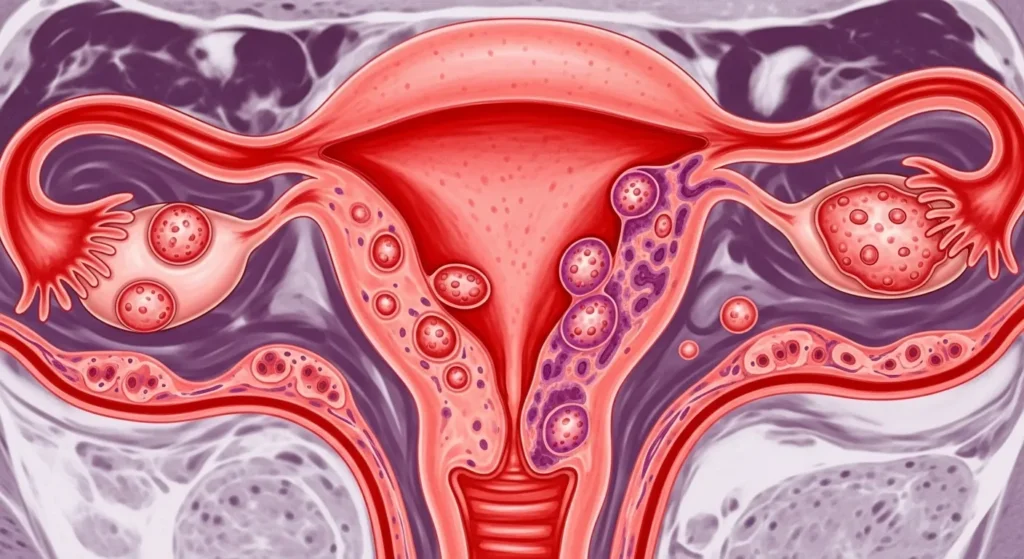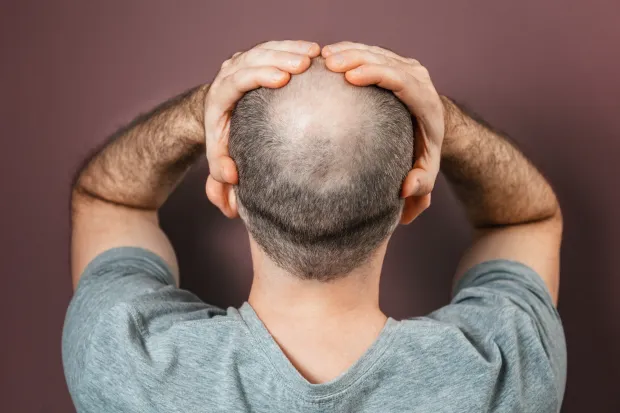Hair loss can be distressing, especially when the cause isn’t clear. Many women wonder: Do fibroids cause hair loss? In this article, we explore how uterine fibroids may impact your hair, the role of hormones, and what you can do about it.
You’ll learn the possible causes, how to tell if your fibroids are to blame, and actionable steps for recovery. Backed by expert insight and trusted sources, this guide helps you get answers—and your confidence—back.
What Are Fibroids?

Overview of Uterine Fibroids
Uterine fibroids are noncancerous growths that develop in or on the uterus, often during a woman’s reproductive years. Also called leiomyomas or myomas, they vary in size and number and are typically hormone-sensitive.
Who Gets Them and Why?
While the exact cause is unknown, factors include:
- Hormonal influences (especially estrogen and progesterone)
- Genetics
- Obesity or high body fat
- Early onset of menstruation
Fibroids are most common in women aged 30 to 50, particularly among women of African descent.
Common Symptoms and Complications
Not all fibroids cause symptoms, but when they do, you might experience:
- Heavy or prolonged periods
- Pelvic pain or pressure
- Frequent urination
- Back or leg pain
- Anemia due to blood loss
Do Fibroids Cause Hair Loss? The Link Explained
Understanding Hormonal Imbalances
Fibroids are influenced by estrogen and progesterone, two hormones that also affect the hair growth cycle. When these hormones are disrupted—either naturally or by medications used to treat fibroids—it can lead to hormonal hair loss, also known as telogen effluvium.
Estrogen and Progesterone’s Role in Hair Health
- Estrogen promotes hair growth and prolongs the anagen (growth) phase.
- Low estrogen or sudden hormonal changes can push hair into the shedding phase.
- Fibroid-related hormonal fluctuations may shorten the hair growth cycle.
How Fibroids May Indirectly Trigger Hair Loss
While fibroids themselves don’t directly attack your hair follicles, they can lead to:
- Hormonal disturbances
- Anemia from excessive bleeding
- Emotional and physical stress—all contributing to hair loss
Medication Side Effects and Hair Thinning
Some fibroid treatments—like GnRH agonists (e.g., Lupron)—reduce estrogen production to shrink fibroids. But this can mimic menopause-like symptoms, including:
- Dry scalp
- Hair thinning
- Increased hair fall

Related Medical Conditions That Contribute to Hair Loss
Anemia from Heavy Periods Due to Fibroids
Heavy menstrual bleeding can cause iron-deficiency anemia, a common but often overlooked cause of diffuse hair shedding.
Symptoms of anemia-related hair loss:
- Hair feels thinner and weaker
- Increased hair on pillows or combs
- Fatigue, dizziness, or pale skin
Thyroid Dysfunction and Hormonal Interactions
Fibroids and thyroid disorders sometimes coexist. Hypothyroidism in particular, can:
- Slow down metabolism
- Disrupt hair cycling
- Causes scalp dryness and breakage
PCOS, Fibroids, and Hair Loss – A Hormonal Triangle
Both Polycystic Ovary Syndrome (PCOS) and fibroids stem from hormonal imbalance. Women with PCOS may experience:
- Androgenic alopecia (female pattern baldness)
- Oily scalp and acne
- Irregular periods and fibroids
How to Tell If Fibroids Are Causing Your Hair Loss
Signs Your Hair Loss May Be Hormonal
- Sudden or excessive shedding
- Thinning over the crown or midline
- Cycle irregularities or mood swings
Diagnostic Tests
Ask your doctor about:
- Hormone blood panels (estrogen, progesterone, androgens)
- Iron and ferritin levels
- Thyroid function tests (TSH, T3, T4)
- Scalp biopsy if needed
When to See a Gynecologist or Dermatologist
See a doctor if:
- You have heavy periods and sudden hair loss
- There’s noticeable thinning over a short period
- OTC treatments aren’t helping
Treatment Options and Hair Recovery
Treating the Root Cause: Fibroid Management Options
Depending on severity and symptoms, treatments may include:
- Medications: Hormone regulators like GnRH analogues or birth control pills
- Minimally invasive procedures: Uterine fibroid embolization (UFE)
- Surgical: Myomectomy or hysterectomy
Hair Loss Treatments and Regrowth Plans
To promote hair regrowth:
- Topical minoxidil (Rogaine)
- Iron and biotin supplementation
- Scalp PRP (Platelet-Rich Plasma) therapy
- Stress reduction and nutritional support

Can Hair Regrow After Fibroid Treatment?
Yes, hair can regrow once hormones stabilize and anemia resolves. However:
- Regrowth may take 3–6 months
- Individual response varies
- Supportive care enhances recovery
FAQs About Fibroids and Hair Loss
Can fibroids affect scalp hair?
Not directly, but the hormonal changes and anemia they cause can lead to hair thinning.
Can fibroids cause patchy hair loss?
Hair loss from fibroids is usually diffuse, not patchy. Patchy loss may indicate another condition like alopecia areata
Will my hair grow back after treating fibroids?
In many cases, yes—especially if the underlying hormone or iron imbalance is corrected.
What nutrients help with hair regrowth after fibroids?
Iron, Vitamin D, Zinc, and Biotin are essential for hair follicle recovery.
When to Seek Help + Treatment Options in Pakistan
If you’re experiencing both fibroid symptoms and hair loss, early diagnosis and coordinated care are key. Multidisciplinary clinics in Islamabad offer:
- Hormone and anemia testing
- Hair loss evaluation
- Personalized treatment plans
Understanding the Bigger Picture
While fibroids may not directly cause hair loss, their hormonal and systemic effects can significantly impact hair health. Addressing the root causes—be it hormone imbalance or iron deficiency—is the first step to regaining both your health and your hair.
Struggling with unexplained hair loss and heavy periods?
Book a personalized consultation with Dr. Rana Irfan, an ABHRS and ISHRS-certified surgeon, or Dr. Uzma Irfan in Islamabad. We offer integrated hair and hormonal health solutions tailored to your needs.
